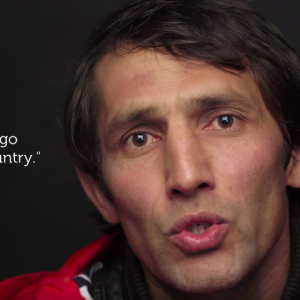“To succeed in your professional life isn’t that hard, but to succeed in your personal life is a lot harder”
French photojournalist Yann Arthus-Bertrand (HOME) launched a new conscious film project on Aug 12, 2015 called ‘HUMAN’ Have a look at the ‘Genesis of the film’ (YOUTUBE), and it’s TRAILER. On a field trip a couple of years ago, Bertrands helicopter broke down in rural Mali. Betrand had the chance to spent a day speaking to local farmers about their concerns, priorities and hopes. Thus examining the basic questions that shape a life. “It was the first time I had ever been confronted with really finding out about a person’s life and experiences.” So since 2012, the crew behind human has been gathering an exceptional range of content. This unique collection of interviews and images is intended to be shared with the widest possible audience. This thanks to Google, the United Nations, and 2,020 willing subjects. Bertrand hopes that HUMAN will seek out meaningful conversations about our responsibilities to each other: “To succeed in your professional life isn’t that hard, but to succeed in your personal life is a lot harder,” and “To really be a human is a lot harder. We forget about that.”
On september 12th 2015, HUMAN became the first movie to premiere in the General Assembly Hall of the United Nations, to an audience of 1,000 viewers, including U.N. Secretary General Ban Ki-moon – WHAT IS LOVE?
- “The emotions, tears, smiles, struggles and the laughs is what unites us all” – WATCH HUMAN NOW
- WATCH HUMAN NOW – Google has already launched six HUMAN-dedicated YouTube channels, offering the film subtitled in Arabic, English, French, Portuguese, Russian and Spanish. The YouTube channels also host three hour-long features on HUMAN.
- To create HUMAN, Arthus-Bertrand and his team of 16 journalists interviewed 2,020 people in 60 countries. Each interview consisted of the same 40 questions, covering heavy subjects from religion and family (“When is the last time you said ‘I love you’ to your parents?”) to ambition and failure (“What is the toughest trial you have had to face, and what did you learn from it?”). The questions stemmed from those asked in 7 Billion Others (YOUTUBE), Arthus-Bertrand’s 2003 project and traveling exhibition that features over 6,000 interviews. (WIRED)
- In the film, single-frame interviews are interspersed with the sweeping shots of deserts and mountains that Arthus-Bertrand is known for, against a soundtrack of world music composed by Armand Amar. Arthus-Bertrand, who points to Godfrey Reggio’s Koyaanisqatsi and Terrence Malick’s Tree of Life as influences, sees the film as a portrayal of the world through three voices: people, landscape, and traditional music. “Getting at the heart of what it means to be a human can be a little heavy,” he says. “The aerial images give you a respite, a moment to reflect on what has been said before.” (WIRED)
- Arthus-Bertrand recognizes that HUMAN is not an objective portrayal of the values of his subjects. After all, each interview consisted of 40 questions selected by his team, probing into views on homosexuality and the cost of war. He calls it “quite a political movie,” and says that his own values informed those in the film: “There are 70 countries in the world where homosexuality is forbidden, and 20 where you can face a death sentence—people didn’t want to talk about it, but it is my duty.” (WIRED)
Yann Arthus-Bertrand’s nonprofit, the GoodPlanet Foundation, will also provide free copies of the film and debate materials for schools and NGOs around the world – contact page here – “Hopefully, it will be a film that opens the discussion,” he says. A-ONE-TO-WATCH! Photo credit: Yann Arthus-Bertrand.
